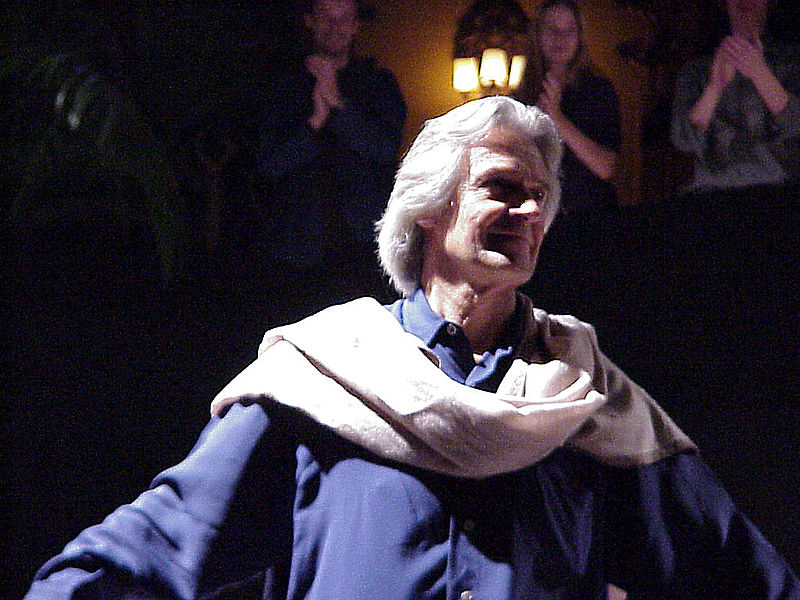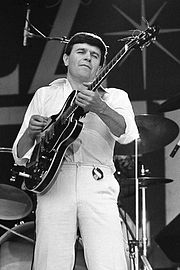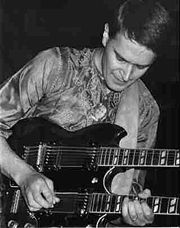BIOGRAPHICAL DETAILS
Description: Guitarist, Composer, UK
Known For: Member of Tony Williams Lifetime
Instruments: Guitar, Keyboard
Music Styles: Jazz fusion, Classical
Location: United Kingdom
Date Born: 4th January 1942
Location Born: Doncaster, United Kingdom
Photo Comments: The above image is intended for those who wish to reuse material (text and/or graphics) from the Wikimedia projects — on their own website, in print, or otherwise. It focuses on Commons as this is explicitly a collection of reusable media.
CONTACT DETAILS
Web Site: John McLaughlin official website
Other Links: See below:
YOUTUBE VIDEO
BIOGRAPHICAL PROFILE
John McLaughlin
John McLaughlin (born 4 January 1942 in Doncaster, West Riding of Yorkshire, England), also known as Mahavishnu John McLaughlin, is an English guitarist, bandleader and composer. His music includes many genres of jazz, and rock, which he coupled with an interest in Indian classical music to become one of the pioneering figures in fusion.
After contributing to several key British groups of the early sixties McLaughlin made Extrapolation his first album as a bandleader in 1969. He then moved to the USA where he played with Tony Williams’s group Lifetime and then with Miles Davis on his landmark electric jazz-fusion albums In A Silent Way, Bitches Brew, A Tribute to Jack Johnson and On The Corner.
His 1970’s electric band, the Mahavishnu Orchestra, performed a technically virtuosic and complex style of music that fused electric jazz and rock with Indian influences.
In 2003, McLaughlin was ranked 49th in Rolling Stone magazine’s list of the “100 Greatest Guitarists of All Time”. In 2010, guitarist Jeff Beck called him “the best guitarist alive”. Tabla player Zakir Hussain has often referred to him as one of the greatest and most important musicians of our time.
John McLaughlin is a leading guitarist in jazz and jazz fusion. His style has been described as one of aggressive speed, technical precision, and harmonic sophistication. He is known for using exotic scales and unconventional time signatures. Indian music has had a profound influence on his style, and, it has been written, he is one of the first westerners to play Indian music to Indian audiences. He was influential in bringing jazz fusion to popularity with Miles Davis, playing with Davis on five of his studio albums, including Davis’ first gold-certified Bitches Brew, and one live album, Live-Evil. Speaking of himself, McLaughlin has stated that the guitar is simply “part of his body,” and he feels more comfortable when a guitar is present.
From a family of musicians (his mother being a concert violinist), McLaughlin studied violin and piano as a child and took up the guitar at the age of 11, exploring styles from flamenco to the jazz of Django Reinhardt and Stéphane Grappelli. He moved to London from Yorkshire in the early 1960s, playing with Alexis Korner and the Marzipan Twisters before moving on to Georgie Fame and the Blue Flames, the Graham Bond Organisation (in 1963) and Brian Auger. During the 1960s he often had to support himself with session work which he often found unsatisfying but which enhanced his playing and sight-reading. Also, he gave guitar lessons to Jimmy Page.
In January 1969 McLaughlin recorded his debut album Extrapolation in London. It prominently features John Surman on saxophone and Tony Oxley on drums. The album’s Post-bop style is quite different than McLaughllin’s later fusion works, though it gradually developed a strong reputation among critics by the mid 1970s.
McLaughlin moved to the U.S. in 1969 to join Tony Williams’ group Lifetime. A recording from the Record Plant, NYC, dated 25 March 1969, exists of McLaughlin jamming with Jimi Hendrix. McLaughlin recollects “we played one night, just a jam session. And we played from 2 until 8, in the morning. I thought it was a wonderful experience! I was playing an acoustic guitar with a pick-up. Um, flat-top guitar, and Jimi was playing an electric. Yeah, what a lovely time! Had he lived today, you’d find that he would be employing everything he could get his hands on, and I mean acoustic guitar, synthesizers, orchestras, voices, anything he could get his hands on he’d use!”
He played on Miles Davis’ albums In A Silent Way, Bitches Brew (which has a track named after him), Live-Evil, On The Corner, Big Fun (where he is featured soloist on “Go Ahead John”) and A Tribute to Jack Johnson. In the liner notes to Jack Johnson, Davis called McLaughlin’s playing “far in.” McLaughlin returned to the Davis band for one night of a week-long club date, recorded and released as part of the album Live-Evil and of the Cellar Door boxed set. His reputation as a “first-call” session player grew, resulting in recordings as a sideman with Miroslav Vitous, Larry Coryell, Joe Farrell, Wayne Shorter, Carla Bley, the Rolling Stones, and others.
He recorded Devotion in early 1970 on Douglas Records (run by Alan Douglas), a high-energy, psychedelic fusion album that featured Larry Young on organ (who had been part of Lifetime), Billy Rich on bass and the R&B drummer Buddy Miles. Devotion was the first of two albums he released on Douglas. In 1971 he released My Goal’s Beyond in the U.S., a collection of unamplified acoustic works. Side A (“Peace One” and “Peace Two”) offers a fusion blend of jazz and Indian classical forms, while side B features melodic acoustic playing McLaughlin on such standards as “Goodbye Pork Pie Hat”, by Charles Mingus whom McLaughlin considered an important influence. My Goal’s Beyond was inspired by McLaughlin’s decision to follow the Indian spiritual leader Sri Chinmoy, to whom he had been introduced in 1970 by Larry Coryell’s manager. The album was dedicated to Chinmoy, with one of the Guru’s poems printed on the liner notes. It was on this album that McLaughlin took the name “Mahavishnu”.
In 1973 McLaughlin collaborated with Carlos Santana, also a disciple of Sri Chinmoy, on an album of devotional songs, Love Devotion Surrender, which featured recordings of Coltrane compositions including a movement of A Love Supreme. McLaughlin has also worked with the jazz composers Carla Bley and Gil Evans.
In 1979 he formed a short-lived funk fusion power trio named the Trio of Doom with Tony Williams on drums and Jaco Pastorius on bass. Their only live performance was on 3 March 1979 at the Havana Jam Festival (2–4 March 1979) in Cuba, part of a US State Department sponsored visit to Cuba. Later on 8 March 1979 the group recorded the songs they had written for the festival at Columbia Studios, New York, on 52nd St. Recollections from this performance are captured on Ernesto Juan Castellanos’s documentary Havana Jam ’79.
Perhaps the most unique tribute to McLaughlin’s influence came in the 1970s from the musician and comedian Darryl Rhoades. In the 1970s, he led the “Hahavishnu Orchestra,” which did parodies of the funk, rock and jazz musical styles of the era.
Personal Life
McLaughlin is married to Ina, and has a son. They live in the south of France. He was formerly married to the French pianist Katia Labeque, who was also a member of his band in the early 1980s.




